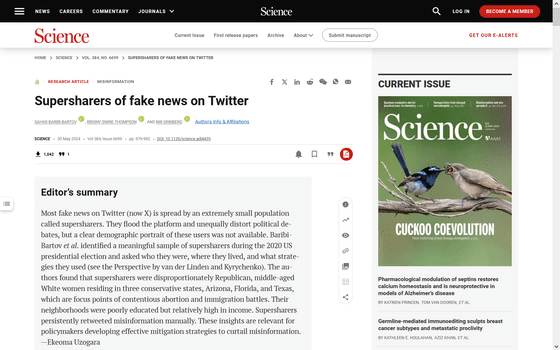1% of Twitter users spread 80% of fake news about the US presidential election, with older, white, Republican and female users more likely to do so

During the 2020 US presidential election, various fake news stories were spread mainly on social media. A study examining the sources of information spread on Twitter (now X) revealed that 80% of fake news stories were spread by just 1% of 'super sharers.'
Supersharers of fake news on Twitter | Science

Tiny number of 'supersharers' spread the vast majority of fake news | Science | AAAS
Sahar Baribi-Bartov and his colleagues at Ben-Gurion University in Israel focused on the 2020 US presidential election and surveyed 664,391 American voters who used Twitter at the time. As a result, it was revealed that 2,107 of the subjects were involved in 80% of fake news related to the presidential election.
The 'super sharers' who spread these fake news stories posted 15.9 news links per day, more than three times more than the average user, and were more likely to post fake news. These posts were mostly done manually.

It was also found that supersharers have a significant influence on the community, being followed by 5.2% of the surveyed people. Another
When examining the sociodemographic characteristics of supersharers, it was found that supersharers were significantly more likely to be women, older people, and Republicans than other reference groups. The average age was 58.2 years old, 17 years older than the average of all subjects. It was also found that supersharers tend to live in Arizona, Florida, and Texas, where issues related to abortion and immigration are frequently raised.

'Our results show that supersharers make up just 0.3% of the population, yet reach a large number of people. This is a powerful phenomenon; if we take the advertising dollars spent by presidential candidates Joe Biden and Donald Trump as a reference, we can estimate that supersharers generated advertising effects worth $20 million. Supersharers are a very interesting group, and their disproportionate negative impact on the general information ecosystem warrants further investigation,' Bartov and his colleagues wrote.
Related Posts:
in Science, Posted by log1p_kr







